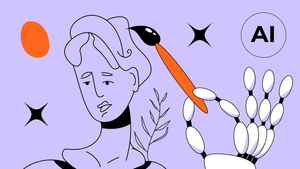The US Copyright Office has set out its arguments for why AI-generated works should not enjoy copyright protection, in the latest stage of a dispute over the copyright status of an AI-generated image called 'A Recent Entrance To Paradise'.
"Precedent confirms the human-authorship requirement", the government agency says in a filing with the Washington DC appeals court. "Since the Nineteenth Century, the Supreme Court has recognised human creativity as the touchstone of authorship. Other circuit courts have rejected efforts to claim copyright in works allegedly authored by nonhumans. And the Copyright Office, in turn, has consistently stated its agreement with these views".
"The text and structure of the Copyright Act evince Congress’s view that the author of a protected work must be human, not machine", it goes on. "From a copyright’s beginning to its end, the Act presumes that a human created the work".
Expanding on that theme, it continues, "the statute automatically vests exclusive rights and ownership in the author. It measures a copyright’s term by the author’s natural life and death. Several sections reference an author’s family or heirs. Still others assume an author’s ability to execute employment arrangements and legal contracts. These provisions plainly contemplate an author’s humanity".
There has been much debate over the copyright status of AI-generated works, whether that's text, images, video, audio or music. It is generally felt that, under most copyright systems, such works do not enjoy copyright protection. Although UK copyright law provides default ownership rules for "computer generated" works, suggesting that those works may, in fact, be protected under the UK system.
To get full protection under American copyright law, works need to be registered with the US Copyright Office, which is why it needs to have an official position on the copyright status of AI generated works. So far it has refused to register works that are entirely generated by AI.
That includes 'A Recent Entrance To Paradise', generated by an AI model developed by Stephen Thaler. He has been fighting the Copyright Office on this for some time, including through the Washington DC courts. A lower court sided with the Copyright Office, so Thaler has taken the dispute to appeal.
One of his arguments is that copyright law allows for companies to own the copyright in works and companies aren't humans. And, in US law, under the ‘work for hire’ principle, companies can be the default first owners of copyrights. Many American record labels would tell you that their record deals are work for hire agreements, meaning they are the default first owner in the recordings they release.
But, the Copyright Office counters, while companies may own the copyright in works, human beings are still involved in creating those works. And where a company owns the copyright on a work for hire basis, it is human beings who are hired to create the work.
"The [work for hire] doctrine allows employers and proprietors - including nonhuman entities like corporations - to be 'considered the author' of a copyrighted work by operation of law", its latest filing states. "But it does not mean that Congress contemplated that nonhuman entities could actually be the 'authors' of a work, as opposed to merely being 'considered the author'".
We await to see if Thaler is able to convince the appeal judges that the Copyright Office is wrong and his artwork does indeed have copyright protection.
Currently the music industry seems to mainly agree with the Copyright Office on this. However, as more artists and labels start to use AI in the creation of music and accompanying artwork, they may ultimately change their minds and seek copyright protection for that content.
Though the Copyright Office has already said that "AI-assisted" works do get copyright protection, which might be enough for AI-using artists and labels. Depending on how much human involvement there needs to be for an AI-generated work to be deemed “AI-assisted”.

